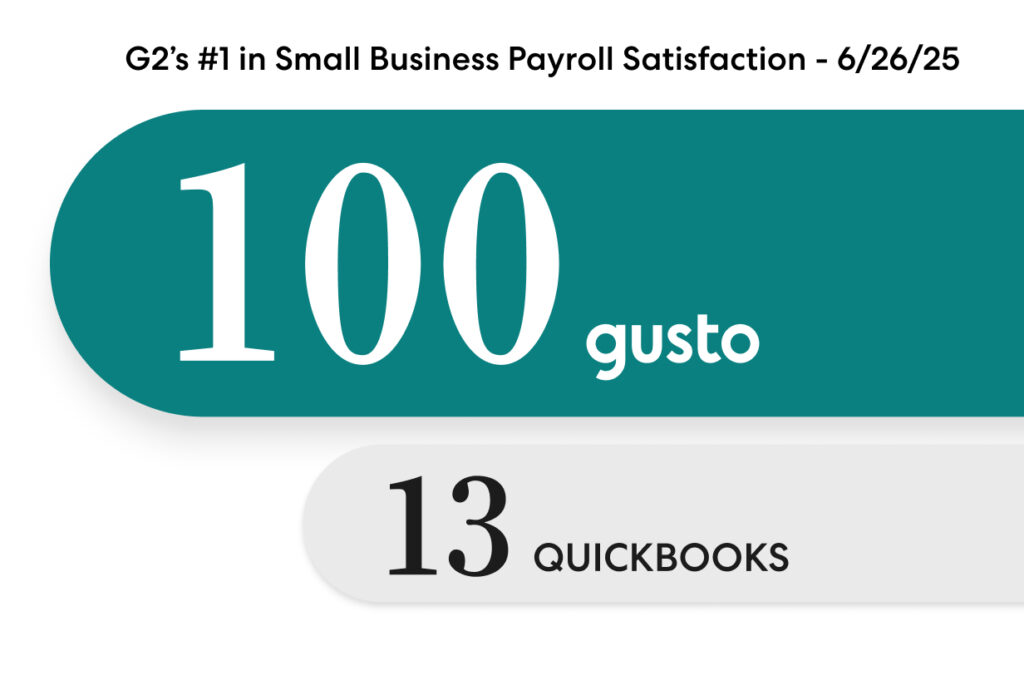Imagine you’re building a house. One company brings the bricks and wood (QuickBooks), and the other brings the team that builds the house and keeps everything organized (Gusto). Both are useful but which one is better for your type of house?
Gusto is mainly used for payroll and HR tasks like paying your team, handling taxes, and offering benefits.

QuickBooks, on the other hand, is mainly for accounting keeping track of your income, expenses, and overall money flow.
If you’re a small business owner or freelancer wondering which tool to use to grow smoothly, this comparison will help you make a smart decision without getting lost in techy terms.
👉 Let’s get started!
Gusto vs QuickBooks Overview: 2026
Let’s break down what Gusto and QuickBooks actually do, and how they help small businesses in different ways.

Gusto
Gusto is like a personal HR team in your computer. It helps you pay employees, file taxes automatically, and manage benefits like insurance all in one place. Perfect for those who don’t want to deal with paperwork.

QuickBooks
QuickBooks is like a digital accountant. It tracks your income, expenses, invoices, and bills, helping you see where your money goes. Great for anyone who needs full control over their business finances.
🤔 Who Is Gusto or QuickBooks Best For?
Choose Gusto if…
You run a small business, startup, or even a remote team and want to simplify tasks like paying your employees, managing benefits, handling tax filings, and keeping HR paperwork in one place.
Gusto is perfect if you don’t have a dedicated HR team but still want to give your team a professional experience with onboarding, direct deposit, and easy-to-access payslips.
Choose Paychex if…
You’re a freelancer, self-employed professional, accountant, or small business owner who needs a powerful tool to track your income, expenses, customer invoices, and overall business performance.
If you’re looking for a solid way to manage all your business finances from one dashboard especially with features like bank sync, tax estimations, and financial reports QuickBooks is a great fit.
🔍 Features Comparison
✅ Core Functionality
Gusto focuses on payroll, employee benefits, tax filing, and simple HR tasks. You can pay your team, handle direct deposits, and take care of compliance all in a few clicks. It’s designed for small businesses that want to avoid the headache of paperwork.
QuickBooks, on the other hand, is built for managing your money. It helps you track every rupee or dollar coming in and going out, generate invoices, and organize your business expenses all from one place.
🎛 Customization / Workflow Flexibility
With Gusto, you can customize onboarding checklists, employee roles, and time-off policies. It’s not super advanced, but it’s enough for most small teams.
QuickBooks gives you more flexibility in financial workflows. You can create custom invoices, add tags to expenses, and adjust your chart of accounts to match your business type. It’s ideal for those who want to control every money detail.

Reporting & Analytics
Gusto gives clear reports about payroll, taxes, employee benefits, and team data. These are helpful for HR or finance reviews, but they’re not super detailed.
QuickBooks shines in this area. It offers powerful financial reports like profit & loss, balance sheets, cash flow summaries, and more perfect if you need deep insights into your business finances.
Automation & Efficiency
Gusto runs payroll automatically, files your taxes for you, and even sends reminders for HR tasks. It removes a lot of manual work.
QuickBooks automates invoice sending, payment reminders, and categorizing expenses based on your past actions. It helps save time, especially during tax season.

UI & Ease of Use
Gusto is very beginner-friendly. The dashboard is clean, colorful, and easy to understand even if you’ve never used HR software before.
QuickBooks is more detailed and has a slight learning curve. It’s easy once you get used to it, but beginners might feel a bit overwhelmed at first.
Team Collaboration
Gusto allows multiple admins, role-based permissions, and easy document sharing with employees. It’s perfect for teams that need basic HR collaboration.
QuickBooks allows you to invite your accountant or team members and assign roles. But collaboration is mainly limited to finance tasks.

Scalability
Gusto works great for startups to mid-size teams. If you plan to grow from 5 to 50 employees, it can handle that easily.
QuickBooks is more scalable when it comes to financial needs. It suits freelancers, growing businesses, and even multi-location operations that need detailed financial control.
Industry Fit / Use Case
Gusto is ideal for service-based businesses, remote teams, marketing agencies, or tech startups that want to manage HR and payroll simply.
QuickBooks fits almost every industry from retail shops to consultants to online sellers. If you handle money and need to track it, QuickBooks can work for you.
💸 Pricing Plans Breakdown
Here’s a look at how much each tool may cost:
💰 Gusto Pricing

| Plan | Monthly Base Price | Per Employee Fee | Key Features |
|---|---|---|---|
| Simple | $49/mo | $6/mo per person | Single-state payroll, reports, and basic support |
| Plus | $80/mo | $12/mo per person | Includes Simple features + Multi-state payroll, time tracking, next-day pay |
| Premium | $180/mo | $22/mo per person | All Plus features + Dedicated support & HR support |
💰 QuickBooks Pricing

Note: Prices may change; always check the official website for the latest details.
| Plan Name | Discounted Price | Regular Price | Users Included | Best For |
|---|---|---|---|---|
| Simple Start | $3.50/month | $35/month | 1 user | Basic bookkeeping for solopreneurs |
| Essentials | $6.50/month | $65/month | 3 users | Invoicing, bill pay, and time tracking |
| Plus (Customer Favorite) | $9.90/month | $99/month | 5 users | Project tracking and inventory |
| Advanced | $23.50/month | $235/month | 25 users | Advanced reports, automation, and support |
⚠️ These prices are promotional and valid for the first 3 months only. After that, regular pricing applies.
Performance Insights
- Gusto loads fast, especially on desktop and mobile.
- QuickBooks works well but can slow down when handling large data sets.
- Gusto has a modern feel; QuickBooks is more traditional but solid.
🔐 Security & Compliance

Gusto
- Uses two-factor authentication (2FA) and strong data encryption to keep employee info safe.
- Fully SOC 2 compliant and offers secure employee portals, making it ideal for HR and payroll compliance like tax forms and labor laws.

QuickBooks
- Protects financial data with strong encryption and 2FA to ensure secure access.
- GDPR-ready, making it a good fit for businesses that need to follow data privacy rules especially in finance.
If you’re in a regulated industry, both are solid, but Gusto shines for HR compliance (e.g., labor laws, tax forms).
🔌 Integrations
- Gusto integrates with: QuickBooks, Xero, Asana, Slack, FreshBooks

- QuickBooks integrates with: Gusto, Shopify, PayPal, Square, HubSpot
👉 QuickBooks has more integrations overall, but Gusto covers all major HR tools.
📞 Customer Support
- Gusto: Live chat, email, phone (Mon–Fri), good onboarding tools.
- QuickBooks: 24/7 chat, phone, large help library.
🔍 Review highlights:

- “Gusto’s team made payroll feel easy.” Trustpilot
- “QuickBooks is powerful but hard to master alone.” G2
🌐 Global Access & Language Support
- Gusto: Only supports US employees and English interface.
- QuickBooks: Multi-currency, supports international teams better.
If you’re running a business outside the US or have international clients, QuickBooks is the better fit.
📈 Growth & Community

Gusto
Gusto offers a growing library of help docs, HR templates, and live webinars made for small business owners. Their content is easy to follow and built for non-HR people, making it a great support system for beginners.
QuickBooks
QuickBooks has a massive user base, tons of YouTube tutorials, forums, and deep developer support. Whether you’re stuck or exploring advanced features, you’ll find answers quickly.
💡 QuickBooks wins on community and training, but Gusto is steadily building a helpful HR-focused ecosystem.
✅ Pros and Cons
Gusto
Pros
- Easy payroll & taxes in one click
- Great UI for beginners
- Built-in employee benefits
- Reliable US-based support
Cons
- No phone support
- Limited for large teams
- U.S.-only

QuickBooks
Pros
- Strong accounting features
- Great for freelancers & accountants
- Works for global users
- Many integrations
Cons
- Learning curve for new users
- Can get pricey with add-ons
🏁 Final Verdict: Which Wins? 🏆
✅ Gusto is the #1 winner 🏆 for small businesses that care about simplicity, automation, and team management. It’s not just a payroll tool it’s a full HR assistant packed into an easy-to-use dashboard.

If your goal is to save time, stay compliant with tax laws, and give your employees a smooth experience from onboarding to paychecks, then Gusto is hands down the smarter choice. Everything feels effortless from running payroll to managing benefits, even if you’ve never done it before.
While QuickBooks is excellent for accounting and bookkeeping, it still lacks the friendly, modern touch Gusto brings to your people operations.
👉 For business owners who don’t want to worry about paperwork or HR chaos, Gusto wins 10/10. It’s built with small teams in mind and it shows.
❓ FAQs
Q1: Can I use Gusto and QuickBooks together?
Yes! In fact, many small businesses use Gusto for payroll and connect it to QuickBooks for accounting.
Q2: Is Gusto good for freelancers?
Not really. Gusto is better for small businesses with employees. Freelancers can use QuickBooks instead.
Q3: Does QuickBooks handle payroll too?
Yes, but it’s an extra paid add-on. Gusto handles payroll more smoothly and is easier to use for that.
Q4: Which tool is better for taxes?
Gusto is better for payroll taxes; QuickBooks is better for business tax reports and deductions.
Q5: What if my team is outside the US?
Choose QuickBooks. Gusto works only for US-based businesses.